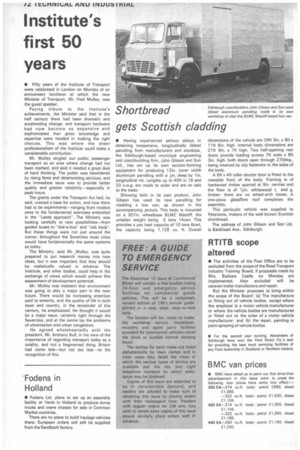Institute's first 50 years
Page 74

If you've noticed an error in this article please click here to report it so we can fix it.
• Fifty years of the Institute of Transport were celebrated in London on Monday at an anniversary luncheon at which the new Minister of Transport, Mr. Fred Mulley, was the guest speaker.
Paying tribute to the Institute's achievements, the Minister said that in the half century there had been dramatic and accelerating change, and transport hardware had now become so expensive and sophisticated that great knowledge and expertise were needed in making the right choices. This was where the sheer professionalism of the Institute could make a considerable contribution.
Mr. Mulley singled out public passenger transport as an area where change had not been marked, and said it needed a great deal of hard thinking. The public was bewildered by rising fares and deteriorating services, and the immediate issue was to provide better quality and greater reliability-especially in peak hours.
The grants under the Transport Act had, he said, created a base for action, and now there had to be experiments—ranging from modest ones to the fundamental exercises embodied in the "Leeds approach", The Ministry was looking carefully at new possibilities—from guided buses to "dial-a-bus" and "cab track". But these things were not just around the corner; throughout the Seventies most cities would have fundamentally the same systems as today.
The Ministry, said Mr. ,Mulley, was quite prepared to put research money into new ideas, but it was important that they should be realistically valued in advance. The Institute, and other bodies, could help in the exchange of views which would achieve this assessment of development potential.
Mr. Mulley was insistent that environment was going to play a major part in the near future. There would be increasing attention paid to amenity, and the quality of life in both town and country, in the remainder of this century, he emphasized. He thought it would be a major issue, certainly right through the Seventies, and at the centre lay the problems of urbanization and urban congestion.
He agreed wholeheartedly with the president, Mr, Anthony Bull, in his view of the importance of regarding transport today as a totality, and not a fragmented thing. Britain had come late—but not too late to the recognition of this.




































































































































































































































